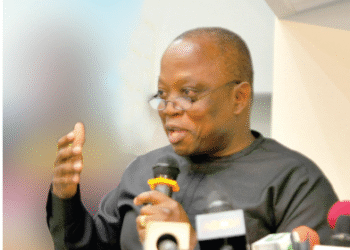The Executive Director of the Ghana Center for Democratic Development (CDD-Ghana), Professor H. Kwesi Prempeh, has blamed the entrenched politicization of public institutions for the persistent wave of corruption and financial crimes within Ghana’s public sector, despite the existence of numerous accountability systems and laws.
According to Professor Prempeh, the country’s growing list of governance and financial management mechanisms, including the Public Financial Management Act, the Ghana Integrated Financial Management Information System (GIFMIS), the Public Procurement Act, the Office of the Special Prosecutor, and the Internal Audit Agency have all been rendered largely ineffective because of the pervasive capture of public institutions by partisan interests.
In a strongly worded critique, the respected governance and anti-corruption advocate lamented that, although Ghana has invested heavily in creating laws, oversight bodies, and digital systems to enhance transparency and prevent abuse of public funds, these mechanisms have been disabled by the very people entrusted with their enforcement.
“When you appoint ruling party politicians and foot soldiers to run all of our public entities—from board chair to CEO to staff—you disable and undermine internal audit and all other internal controls, systems, and safeguards”.
Executive Director of the Ghana Center for Democratic Development (CDD-Ghana), Professor H. Kwesi Prempeh
Professor Prempeh argued that the country’s problem is not a lack of laws or institutions but a crisis of political will and ethical leadership.

He stressed that when political parties turn state institutions into “reward centers” for loyalists, the systems meant to ensure accountability are weakened from within.
“The people nominally in charge of enforcing or ensuring compliance with these safeguards are also themselves either party appointees or career civil servants who do not have what it takes to stand up to those who come bearing green-coloured appointment letters.”
Executive Director of the Ghana Center for Democratic Development (CDD-Ghana), Professor H. Kwesi Prempeh
Pervasive Political Patronage Vrs a Culture of Impunity
He explained that this pervasive political patronage creates a culture of impunity where wrongdoing is either ignored or covered up, especially when the perpetrators are politically connected.
“It is far easier to join and collude with the latter than to try to stop them. This is why so many of these crimes are detected and prosecuted only after there has been a party turnover in government.”
Executive Director of the Ghana Center for Democratic Development (CDD-Ghana), Professor H. Kwesi Prempeh
The CDD-Ghana Executive Director observed that successive governments have continued the pattern of politicizing governance institutions instead of reforming them to function professionally and independently.

As a result, the anti-corruption architecture has become more symbolic than effective, with accountability measures kicking in only when the political landscape changes. “This is not rocket science. We cannot keep doing things the same old way and expect different results, ” he said.
His comments come at a time when public outrage over corruption and financial mismanagement is intensifying, following a series of forensic audits that have exposed massive embezzlement schemes in state institutions.
The recent forensic report by the Auditor-General on the National Service Authority, which uncovered fraudulent payments and ghost names amounting to millions of cedis, has reignited debates about the failure of internal control systems across the public sector.
Analysts have echoed Professor Prempeh’s sentiment that the problem is deeply structural. Many argue that until public appointments are depoliticized and institutional independence is guaranteed, new technologies and oversight laws will continue to fail.
In the view of governance experts, Ghana’s political system encourages the use of state entities as avenues for patronage and rent-seeking rather than service delivery and accountability.
Professor Prempeh’s critique underscores a recurring theme in Ghana’s governance discourse: that the state’s anti-corruption framework, though robust on paper, has been compromised by the politicization of leadership positions and the absence of credible enforcement.

By prioritizing political loyalty over competence, governments have created a public administration culture where the distinction between party and state has become increasingly blurred.
He further urged that Ghana’s governance reform efforts must shift from adding more institutions to strengthening existing ones.
In conclusion, Professor Prempeh called for a national rethinking of how governance is conducted, emphasizing that corruption will not be eliminated by new laws or systems alone but by depoliticizing the public sector and restoring integrity to the state’s administrative machinery.
READ ALSO: ACEP Warns Ghana’s Energy Subsidies Have Become a Major Fiscal Threat























